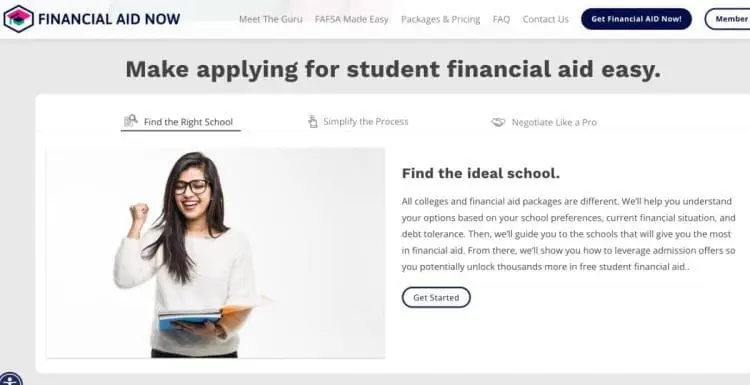There is no doubt that college can be an expensive, but important, investment in your child’s future. College tuition bills are skyrocketing and so is student debt. Financial planning for college is a necessity. This article will give you several strategies to financially prepare for the cost of college. I’ll start with tips for how to pay for college without financial aid. Next, I will talk about types of financial aid and how to get financial aid. For many people, how to financially prepare for college will include both types of preparation. I hope you find these tips for how to prepare financially for college helpful. They include both long term and short term strategies.
Ways To Pay For College Without Loans Or Financial Aid:
As a parent, one of the scariest things I have to think about is paying for college- and I only have 2 kids! Going to college is so important and I want to show them how much I support them by at least helping them pay for part it. I expect them to show their commitment by getting good grades and trying to earn a scholarship. I imagine that we will end us using various ways to pay for college, much like mine- I received some scholarship money, I worked part time, I got student loans, and my mom paid for part of it, because college is not cheap! And like everything else, the tuition costs keep rising! Here are some ways parents can think about saving and paying for college.
Start Saving Early.
First, evaluate your financial situation today. Is there room for saving? Then look at the amount of time that you have available to save before your child reaches college age and estimate how much it may cost for your child to attend college, once he or she reaches that age. Now determine how much savings will be needed to pay for college and determine if you can set the right amount aside to get there.
Unfortunately, many parents wait until high school to start thinking about saving for their child’s college education. The reality is, the sooner, the better. There are many programs like the Gerber Life College Plan that help parents save for college from the moment their child is born. Even if you can’t contribute a lot to a savings account for college, anything is better than nothing. Over time, small monthly deposits can add up. Financial advisors are recommended for those with complex finances or large assets.
Take Advantage Of Cash Back Shopping.
Upromise is a free to join membership service that allows families to earn cash back for college through every day purchases. Upromise members can earn up to 5% cash back just by shopping with Upromise partners—including more than 850+ online stores and 10,000+ restaurants, grocery and drugstore locations. Popular online retail partners include Amazon.com, Bed, Bath & Beyond, Macy’s, Nordstrom, Staples and way more. You can even check into the Upromise credit card as a way to earn more back.
To date, Upromise members have earned over $850,000,000 and counting, helping families contribute to college tuition, expenses and loans. Members can allocate their cash back earnings in several ways to help plan, save and pay for college.
Upromise members can:
- Transfer earnings to eligible 529 plans or high-yield savings accounts
- Apply earnings to student loan repayment
- Request a check for cash for books and other expenses
- Split up earnings across multiple beneficiaries
Learn more about Upromise at Upromise.com
Keep It Separate.
Many parents think of college savings as part of another investment. Similarly, parents may see college costs as something to be funded from a common savings account. However, it is important to keep college savings deliberately separate from your other long-term finances, including retirement savings. In this way, you can protect your ability to reach your retirement income needs.

Encourage Academic Success.
How well your child performs academically in school may determine how much financial help they will receive for college through scholarships and grants. If students are taught the importance of succeeding scholastically from an early age, their chances of receiving merit based aid for good grades in high school is more likely. It also makes them more eligible for most scholarships.
In addition, many parents and college graduates feel that asking the child to contribute to his or her own education makes for a greater sense of responsibility for and sense of accomplishment upon graduation.
Tax Credits.
As of 2021, there are two tax credits available to help reduce the costs associated with college by lowering your income tax. To be eligible to claim the AOTC or the LLC, this law requires a taxpayer (or a dependent) to have received Form 1098-T, Tuition Statement, from an eligible educational institution. Please consult with a qualified tax professional for details.
- The American Opportunity Tax Credit. The AOTC helps defray the cost of higher education expenses for tuition, certain fees and course materials for four years. It is a tax credit of up to $2,500 of the cost of tuition, certain required fees and course materials needed for attendance and paid during the tax year.
- The Lifetime Learning Credit offers up to $2,000 a year as a tax credit for each eligible student for tuition, fees or supplies that need to be purchased through the school, for an unlimited number of years.
529 Plan.
There are two tax-advantaged 529 savings plans for future college costs: a prepaid tuition plan and a college savings plan.
- Prepaid tuition plans allow you to purchase credits at participating colleges and universities for future tuition. Most prepaid tuition plans are restricted by state and have residency requirements. They cover tuition and occasionally room and board as well.
- College savings plans allow the account holder to choose among several investment options. The college savings plan invests on behalf of the account holder. It covers tuition, room and board, other fees and required supplies such as computers and books.
A 529 is a tax-advantaged investment account designed for college savings. This means you can make investments that grow over time and save on taxes, since the gains will be tax-free.
Trade.
The Peace Corp and ROTC programs offer college money in exchange for a service commitment.
Now, on to tips to pay for college with financial aid.

How To Get Financial Aid
There are several types of financial aid or money to help pay for college. Grants, scholarships, works-study, and loans are the four types of financial aid. Most grants and scholarships do not have to be paid back. You must qualify for them to earn but then they are basically, “free money.” Work study will require a part-time job. You will need to pay back loans. Therefore, it is very important to understand the different types of financial aid available. The first step in how to get financial aid is to apply by FAFSA. This is done in the fall of the child’s senior year of high school and each fall there after until they are done with college.
Become Familiar with the FAFSA.
The Free Application for Federal Student Aid is an annual online application. It is open for completion in the fall of student’s senior year of high school. It determines their financial aid eligibility, including the Pell Grant, federal student loans and Federal Work Study. This federal tool will calculate what your family might be responsible for paying, known as the expected family contribution. It is also the source of information that colleges and universities use to come up with the financial aid packages they offer each student. It lets colleges see what the student’s needs are and what federal government money they qualify for. Then many colleges will add to that their own institutional grants and scholarships to that package. Private colleges to tend have larger coffers for such institutional aid (but then their tuition does tend to cost more).
My daughter is a senior in high school this year and I am using Financial Aid Now to help me with the financial aid process. This service has software to help match your child to colleges and universities that have historically provided good funding for students according to their grades and need levels. It also has software to help you apply to FAFSA with ease. Sort of like TurboTax does for your tax forms. Furthermore, it helps with the financial aid application process for the CSS profile that some competitive private colleges require. Finally, it teaches you how to negotiate your financial aid package if necessary. I am loving the wealth of information so far!

Private Scholarships
There are several kinds of private scholarships available. The key is to apply early, no later than the summer before your child’s senior year of high school. While applying for scholarships, your teen may want to find a summer job to ease the financial burden of college tuition.
There are essay scholarships, which as the name implies have a lot of weight placed on an essay the applicant must write. Other easy scholarships include no-essay scholarships, which do not require a written essay by the applicant. If your child is not skilled at writing, you may want to seek out no essay scholarships.
One big scholarship opportunity is in the world of sports. If your teen is a gifted athlete, seeking out a sports scholarship may be an option. Sports are very popular, and the competition is intense, so a worthwhile strategy would be to apply for non-sports scholarships, too.
Some scholarships are even based around hobbies, such as scholarships for learning the Klingon language from Star Trek! Scholarship opportunities like these serve as a creative way for teens to earn more money. The important takeaway is to look at your teen’s strengths and apply for scholarships that speak to those strengths.
Remember that all scholarships have a minimum grade point level for consideration. Even the most gifted athletes have to do well academically to be considered for scholarships.
Where to Look for Scholarships
You can find many scholarships online. Simply search for “scholarships” and you will soon have pages of Google results to comb through. Such a scattershot approach may not be the best use of your time.
If your teen is applying to specific colleges, start there. Many colleges and universities enter qualified applicants automatically into their scholarship pool during the admission application process. Before applying, you can also call the college directly and ask them about scholarship opportunities.
Your teen’s guidance counselor in high school is another good source. Moreover, the counselor may be able to direct you to many sources of scholarships for high school seniors.
Sports scholarships are a different animal. Many movies paint a glorious picture of college scouts showing up just as the high school teen wins the big game for their team. In real life, you will have to be more proactive.
You can contact the athletic director for the colleges your teen is interested in attending. Your teen should write a well-written one-page letter to accompany a video introducing themselves to the coach along with performance highlights. Follow up a couple of weeks after the letter goes out.
How to Apply for Scholarships
Your teen should look at their hobbies and social activities with an eye on what can translate to a scholarship. Look at your family’s economic status. There are scholarship opportunities based on financial need.
If your family is a minority, consider those scholarship options as well. Does your teen have any physical disadvantages? After all, they may qualify for scholarships specific to their unique qualities.
Once you have settled on the scholarships you are targeting, the websites will walk you (or your teen) through the application process. A pro tip is to save essays and passages in a Word doc for future applications, saving a lot of time.
Student Loans.
Loans should only be used as a last resort, but they are there to lend you some temporary relief. Just remember, you must pay back a loan and some loans may have interest rates. There are a lot of different types of loans available for students. Filing the FAFSA annually will help you secure some loans that your student is eligible for. The most important thing to know is the difference between a subsidized and unsubsidized loan.
- Subsidized loans are based on financial need, and no interest is charged while college students are enrolled in school and during the grace or deferment period.
- Unsubsidized is not based on financial need, and interest is charged right away.
Juno uses group buying power to help negotiate the lowest rates. Students need to know what they are getting into. Help them ask questions so they can learn about the true costs of loans, pick loan terms, and find lower interest rates. Review payment plan options and discuss credit scores.
Student Loan Interest Deduction.
You can take a tax deduction for the interest paid on any student loan used to pay for higher education expenses for your child, yourself or your spouse. The maximum deduction is $2,500 a year.
According to the Federal Reserve Board of New York, there are approximately 37 million student loan borrowers with outstanding student loans today.
Private Loans
Private loans are another way families can fill the gap to pay for higher education costs. Look for a lender with a sole focus on private student loans. A company that specializes in student loans can deliver student loans that are simple, clear, and personalized for the individual. How much you want to borrow depends on you but I want to borrow zero if possible. It may be better to chose a cheaper state school than a big name private school if it involves $30,000 a year in loans. Carefully consider all options before going in debt.
Chose the school that gives you the best financial aid package. Assuming an equal education opportunity, the price can vary tremendously and why not choose the best deal? This is a good time to consider your future career too. When thinking about how much to borrow, consider your future earnings potential to see if it makes sense.
Attending an in-state institution may save tons of money! As Steve Siebold of How Money Works says, “Your tax dollars support state-run schools, so if you attend college in the state in which you live, you can get a huge break. Out-of-state students often pay double and even triple what in-state students pay. Not only that, but if you attend school where you live, you can live at home and save money on housing and food.”
Conclusion On How To Prepare For Future Education Expenses
I love this quote from Colin Powell, “A dream doesn’t become reality through magic; it takes sweat, determination and hard work.” It is the same thing with saving for college. It doesn’t happen by magic. You have to create a plan to save for college. It is so much easier paying for college if you start planning and saving early. Furthermore, little bit over a long period of time can really add up!
Don’t forget to see if your state offers any state specific college perks. Some states may offer free local community college while others offer programs like the Hope Scholarship. In state tuition is also a huge money saver when it comes to meeting the cost of attendance. It is important to know all of the options for paying for college and explore them before hand. Also keep your child in the loop so they can learn life long financial skills and make better financial choices.
In conclusion, I hope you found these tips for how to prepare for college financially helpful. Although it is best to start planning and saving for your child’s higher education early, it is never too late to start preparing. Additionally, be sure to take advantage of the financial help that is available to pay for college expenses. Which part of these college preparation tips was helpful to you?
Related Posts:
How To Teach Kids Financial Responsibility


Ellen Christian says
These are great ideas. I’d also recommend having the teenager get a part time job to help earn extra money as well. My daughter is a sophomore in college right now & helps contribute.
Scarlet says
Great point Ellen. I worked a part-time job in college too!
Debt.org says
These are great tips on how to prepare for future education expenses. We hope this information helps your readers prepare for the financial responsibility that college brings. It is best to avoid private student loans when possible.
Desmond says
This is a great post! Having young children of my own makes me think about how we will afford college more and more. Thanks for the insightful tips. I think I will have my kids get a part time job when they are of age to teach them some real life lessons. This should give them a sense of accomplishment by earning some of their own income to help pay for college as well!
Anoop Gupta says
Hi Scarlet,
That’s an informative blog post on how parents should prepare financially for their children’s education. Being a parent we are worried about our child’s higher education. So, I believe financial literacy is very important to deal with any situation in life and your tips are definitely going to help this out. I will definitely share it with my children and tell them to check out more about the Upromise.
Thank you.
Gaurang Joshi says
Thanks Scarlet for the handful of advice on important factors for getting private merit aid scholarships.